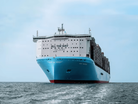Maersk Sustainability Reporting: Navigating Scope 3

With the Corporate Sustainability Reporting Directive (CSRD) now in effect, sustainability reporting has become more intricate, particularly for companies with complex supply chains. A.P. Moller-Maersk's first CSRD-aligned Integrated Annual Report for 2024 demonstrates the company's ongoing commitment to its sustainability goals, including its ambitious target of reaching net zero by 2040.
Lene Bjørn Serpa, Director and head of Corporate Sustainability & ESG at A.P. Moller-Maersk, offers insight into the evolving landscape of sustainability reporting: "Now that the first company reports are coming out, I am sure we will start to see studies that can provide a more solid and comprehensive assessment of the value of the disclosures from the perspective of the users of the reports and thereby point to relevant opportunities to simplify the standards."
Maersk is crucial in simplifying and connecting supply chains worldwide as an integrated logistics company. Its commitment to sustainability extends beyond its operations, encompassing the entire supply chain through innovative technologies, vessels and green energy solutions.
Maersk's ESG progress in 2024
Throughout 2024, Maersk made significant strides in integrating ESG into its business operations.
- Fleet expansion: Welcoming seven dual-fuel methanol vessels and introducing the Maersk Halifax, the world's first retrofitted dual-fuel methanol vessel.
- Future planning: Announcing a renewal plan for its owned and time-chartered fleet, with over 50 vessels expected to begin service between 2026 and 2030.
- Fuel agreements: A significant long-term offtake agreement for biomethanol fuel was established, with the first volumes expected in 2026. Maersk's combined methanol offtake agreements now cover more than 50% of its dual-fuel methanol fleet demand for 2027.
- Energy efficiency: Continued to improve the energy efficiency of its fleet through new technologies and enhanced operations, lowering the emissions intensity of its ocean operations.
Despite the improvements, Maersk reported an increase in absolute greenhouse gas emissions from 2023 to 2024, primarily due to the ongoing Red Sea situation. The situation led to vessel rerouting, capacity shortages and port congestion, necessitating faster sailings.
Climate change and supply chain resilience
Maersk's report highlights the growing impact of climate change on supply chains. Projections suggest that climate-related challenges will intensify throughout the decade, with losses from extreme weather events expected to rise.
In 2024 alone, 219 extreme weather events were recorded, causing widespread damage. Intense hurricanes in the US and devastating floods in Spain not only claimed lives but disrupted regional logistics operations.
The report highlights the need for logistics providers to recalibrate operations to mitigate risks from climate-driven disruptions:
"Volatility became a defining feature this year and is here to stay, further amplifying the complexities of supply chain management. Disruptions are the new normal, with fluctuating trade routes, sudden shifts in demand and environmental concerns shaping the global trade landscape."
The role of third-party content in sustainability reporting
As companies navigate the complexities of CSRD-aligned reporting, integrating third-party content becomes increasingly valuable. The approach can provide fresh perspectives, broaden the target audience and offer varied insights into sustainability efforts.
For businesses in Maersk's supply chain, understanding and leveraging third-party content in their sustainability reporting can help create a more comprehensive picture of their environmental impact and progress towards sustainability goals.
In conclusion, as sustainability reporting evolves under the CSRD, companies like Maersk aim to set the standard for comprehensive, integrated reporting that addresses the complex interplay between business operations, environmental impact and supply chain resilience.
Make sure you check out the latest industry news and insights at Scope 3 Magazine and be part of the conversation at our global conference series, Sustainability LIVE and Procurement & Supply Chain LIVE.
Discover all our upcoming events and secure your tickets today. Subscribe to the Scope 3 Magazine newsletter.
Scope 3 Magazine is a BizClik brand.
Featured Articles
Estonia, Latvia and Lithuania join the European grid, cutting ties with Russian energy, a move that boosts regional security and sustainability
TÜV SÜD: New battery regulations bring Scope 3 hurdles, requiring sustainable sourcing, digital traceability and design changes increasing compliance
Nissan is scaling up its use of green steel, reducing CO2 emissions in its supply chain as part of its goal to achieve carbon neutrality by 2050

